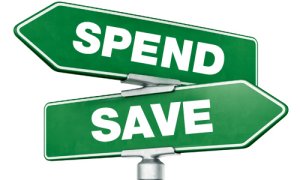
Sometimes I find myself spending a little too much money. Maybe I am going out to eat more often, running to the store for little things we really don’t need, or maybe just enjoying too much entertainment. It happens over and over again.
Usually when I realize I am spending too much money I force myself to stay at home by not putting gas into my car. That’s just a little psychological ploy I use to remind myself that I really don’t need to be running out and doing things. I think, “If I had no money in the bank, would I really be driving out my last quarter tank of gas for this errand?”
Often that is all it takes. I spend more time at home with my family, we watch a little more television, we take more walks down the street, and we eat the food we have stored at home.
I learned this trick when I was in college. I kept spending my allowance well before I received more money at the beginning of the next month. One week as I was putting my last fifty dollars in my wallet I realized I would need some money for more than 10 days. So I took $30 and put it in a drawer. That weekend I forced myself to “live” on just $20. I had a lot of fun because making the hard choices about where to spend that $20 made me relish my choices all the much more.
You appreciate the effort you put into an experience when it costs you more than when it costs you nothing. A Johns Hopkins study proved this is really true. I did not know that when I was in college but it sure makes sense now.
The value we place on the rewards we receive is relative to the effort required of us to earn those rewards. Dieters have learned to use this trick to keep their motivation strong, although using non-food rewards is better than breaking the diet plan.
Our mental reward systems are being studied by medical researchers, who have learned that we appreciate the rewards we choose for ourselves more than those that are pre-selected for us. Hence, deciding how to reward yourself for being frugal is as important as how to trigger that sense of frugality in the first place. You want the money-saving exercise to feel fulfilling and justified, to be rewarding.
By training ourselves to feel satisfied with self-discipline we are less likely to feel deprived or to cave in to the urge to make needless purchases. And such feelings are important harbingers of deeper issues. For example, materialistic people are more likely to spend money when they feel stressed. So devising a trigger-and-reward system for yourself that includes relaxation and stress management techniques may work better for some people than others.
The bottom line here is simple: when we take responsibility for our unnecessary spending and treat ourselves with respect, we are more likely to be successful than if we rely solely on self-shaming. The opportunity to NOT spend money is the same as the opportunity to use money as a salve for boredom, stress, or some other momentary feeling. It just comes down to how we teach ourselves to see these moments and how to respond to them.
